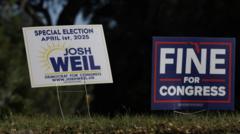American businesses are lobbying for balanced trade with Europe, highlighting issues such as high EU tariffs on US goods. While some firms back Trump’s tariff initiatives to level the playing field, others fear retaliatory actions could worsen the situation, showcasing the complex dynamics of international trade relations.
US Businesses Rally for Trade Balance Amid Tariff Tensions

US Businesses Rally for Trade Balance Amid Tariff Tensions
As the Trump administration prepares new tariffs, American firms express both support and concern over the implications of trade policies.
Amid rising tensions regarding trade, US firms are mobilizing behind President Trump’s impending tariff strategy, especially concerning a significant trade imbalance with the European Union. Interestingly, while the US imports over $200 million in European fruit spreads annually, American doors remain closed to EU consumers, with less than $300,000 in US-made jams reaching the European market. JM Smucker, a notable American purveyor of jams, attributes this disparity primarily to steep EU import tariffs exceeding 24%. In a recent letter, the company implored the Trump administration to consider "reciprocal" tariffs as a means to rebalance the trade equation, given America’s significantly lower jam tariffs at 4.5%.
Globally, Trump’s aggressive tariffs against close trading partners have elicited confusion and outrage, with economists warning that such measures could escalate prices for consumers and inflict economic damage. Multiple businesses, while echoing the call for action, express trepidation over a trade war that could potentially spiral out of control. Numerous firms have submitted letters to the White House voicing their issues, such as apple farmers highlighting stark import duty discrepancies and streaming companies challenging digital taxation practices harming their growth.
While America’s oil and natural gas lobby pushes back against burdensome regulations in foreign countries, various industries are left pondering the efficiency of one-size-fits-all tariffs. As the anticipated announcement of new duties on April 2 approaches, uncertainty looms regarding the administration’s plans and objectives. Trump’s recent comments about increased tariffs contrasted with statements about “being nice” indicate a muddled approach that leaves businesses perplexed.
Despite concerns, certain countries like India are responding proactively, vowing to lower their tariffs in light of Trump’s threats, while analysts express skepticism over whether these tariffs will lead to constructive negotiations or solely serve as punitive measures. The complexities of enforcement vs. long-term trade negotiations create a landscape fraught with ambiguity, leaving industries to navigate their desires for protection without triggering retaliation. Firms such as NorthStar BlueScope Steel are advocating for specific exemptions within broader tariffs to prevent adverse effects on their supply chains.
Wilbur Ross, former Commerce Secretary, remains optimistic that clarity in Trump’s tariff plans will allay business worries, hinting at potential revenue generation and enhanced manufacturing. Republicans continue to align with Trump’s strategy despite ongoing market volatility linked to tariffs, with some acknowledging the initial pain but asserting that ultimately, the focus will cultivate opportunities for American manufacturers. Representative Jodey Arrington emphasized the need for fair trade practices, suggesting that rectifying imbalances would ultimately lead to beneficial outcomes for all parties involved.





















